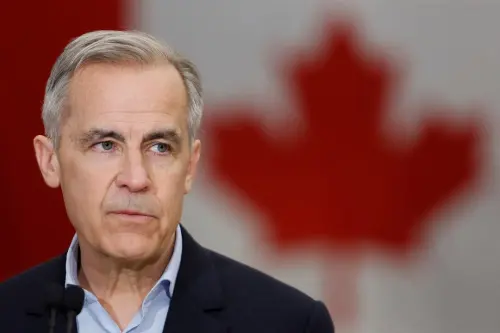New Canadian Prime Minister Mark Carney has called a snap election for April 28, seeking a strong mandate to address the challenges posed by U.S. President Trump, who he claims "wants to break us so America can own us."
This statement highlights the deterioration in relations between the U.S. and Canada, traditionally close allies and significant trading partners, especially following Trump's imposition of tariffs on Canadian goods and threats of annexation.
Although the next election was not scheduled until October 20, Carney aims to leverage a significant recovery in his Liberal Party's poll numbers since January, when Trump intensified his threats against Canada and former Prime Minister Justin Trudeau announced his resignation.
In his swearing-in on March 14, Carney expressed willingness to work with Trump, but he adopted a more confrontational tone in recent remarks.
"We are facing the most significant crisis of our lifetimes due to President Trump's unjustified trade actions and threats to our sovereignty," Carney stated after receiving approval from the Governor General for his election request. "Our response must be to build a strong economy and a more secure Canada. We will not let that happen."
The White House has not commented on Carney's statements.
Trump recently postponed a broad 25% tariff on some Canadian goods for 30 days, but has already imposed tariffs on steel and aluminum imports and threatened further tariffs on products including Canadian dairy and lumber.
Polling data indicates that Canadians are primarily concerned about the potential negative impacts of Trump's tariffs, according to Nik Nanos of Nanos Research, who noted that Carney may be positioning for a stronger response on April 2.
Having recently taken the Liberal leadership, Carney is attempting to convince Canadians of his capability to handle Trump. He has five weeks to connect with voters and has proposed a one-percentage-point cut to the lowest income tax bracket.
Current polls show the Liberals, who have governed since 2015 and were lagging behind the Conservatives earlier this year, are now slightly ahead.
Darrell Bricker, CEO of Ipsos Public Affairs, remarked on the election's shift in focus. "The ability of the Conservatives to attack the Liberals has been greatly diminished because people are focused on the here and now," he stated.
The Conservatives are portraying Carney as an elitist who will continue high government spending from the Trudeau era, and they question his transparency regarding the transfer of his assets into a blind trust. Carney’s reaction to inquiries about the trust has raised concerns, potentially providing an opportunity for the Conservatives during the campaign.
Carney's success may hinge on his performance in Quebec, where he stumbled when responding in French during a press conference. In contrast, Conservative leader Pierre Poilievre is fluent in French and a seasoned politician with extensive campaign experience.
"What we need to do is put Canada first for a change," Poilievre stated at the launch of his campaign, arguing that his policies would attract investment and increase Canada’s self-reliance in negotiating with Trump.
Laura Stephenson, a politics professor at Western University, suggested that Carney’s inexperience might not be as detrimental given the broader context, predicting that voters may show more leniency toward politicians during this campaign.
An online Angus Reid poll of 4,009 respondents indicated the Liberals at 42% and the Conservatives at 37%, with a margin of error around 1.5%.
